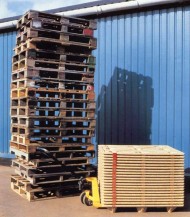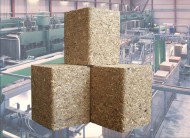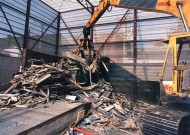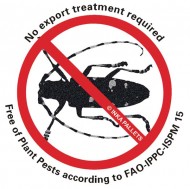 Inka Presswood Pallets has been in business for over 25 years as the UK distributor of the Presswood Pallet, and is dedicated to increasing the awareness and popularity of these and its other pallet products throughout the UK. Now, with the new European regulations taking effect in March 2013 and the forthcoming likely restrictions in movement of timber pallets across borders within Europe, Inka is set to offer assistance to everyone involved with moving goods on pallets here, throughout the EU and to all global destinations.
Inka Presswood Pallets has been in business for over 25 years as the UK distributor of the Presswood Pallet, and is dedicated to increasing the awareness and popularity of these and its other pallet products throughout the UK. Now, with the new European regulations taking effect in March 2013 and the forthcoming likely restrictions in movement of timber pallets across borders within Europe, Inka is set to offer assistance to everyone involved with moving goods on pallets here, throughout the EU and to all global destinations.
When the new EU995/2010 timber regulations come into force, users of Inka’s Presswood Pallets and EUROBLOCK pressed wood composite blocks, which they supply to timber pallet manufacturers, can be sure from the outset that they comply. In addition, Inka’s products are certified by PEFC, the global industry body which works throughout the forestry supply chain to promote good practice and ensure that timber products are produced with respect for the highest ecological, social and ethical standards.
Inka’s Presswood Pallets and EUROBLOCK are also exempt from the ISPM15 regulations introduced 10 years ago to prevent the global spread of plant diseases and pests associated with the international movement of wooden packaging. Under ISPM15, raw timber must be specially heat treated before use in the production of pallets for export, but again, users of Inka Presswood Pallets and heat-treated pallets made with EUROBLOCK need not worry about pre-ordering or holding special stocks for export consignments, they can simply take the next pallet off the stack and send it anywhere in the world.
While Presswood pallets and EUROBLOCK remain Inka’s core products, Inka’s offering has broadened in recent years to include their innovative Capacitainer Pallet Boxes, which are easily assembled and can be fixed to an Inka Presswood Pallet, and a range of plastic pallets and plastic storage bins, made with recycled granulate. Inka also offers a selection of other pallet-related products and complete bespoke packaging to handle all types of goods.
In short, Inka has a great deal to offer everyone involved with using pallets in 2013 and beyond. Mark Springham, Director of Inka Presswood Pallets, spoke to Warehouse & Logisitics News.
Warehouse & Logistics News – First of all, Mark, how did you come to join Inka Presswood Pallets? What were you doing before that?
I returned from three years of travelling in 1987. Whilst I had been away my father (Ken) and a colleague had left TriWall as UK MD and established Inka. Since the company was still in its infancy and I had grown up with packaging, I was asked to come and help out for a few months. Fast forward 25 years, and I’m still here!
WLN – What does your current role as Director involve day to day?
 It’s very much hands-on, which is what I love about it. I’m not an Ivory Tower director, I work alongside my team. So while I will oversee every aspect of company activity from board level down, I feel it is important that I understand every role in the office and warehouse and contribute where required. Unfortunately we had two key personnel retire this year, who between them had worked for over 50 years in the company. Therefore, although we have had more changes than normal, I am extremely happy with the new team – I’m calling it the ‘next generation.’
It’s very much hands-on, which is what I love about it. I’m not an Ivory Tower director, I work alongside my team. So while I will oversee every aspect of company activity from board level down, I feel it is important that I understand every role in the office and warehouse and contribute where required. Unfortunately we had two key personnel retire this year, who between them had worked for over 50 years in the company. Therefore, although we have had more changes than normal, I am extremely happy with the new team – I’m calling it the ‘next generation.’
WLN – With all of these changes, do you feel the company is less stable?
No, I don’t feel that at all. Inka became part of the Vierhouten Group four years ago, and with the economic climate on a precipice it couldn’t have been better timed. We, like many companies, have felt the effect of the global recession, but having the solid backing of the Vierhouten Group, this development has made us stronger than ever!
WLN – Where are you based? What happens there?
We’re based near Brentwood, Essex, where we hold large quantities of each style of Presswood Pallet and our other products. We carry out a final inspection on all despatches to ensure premium quality for all of our customers. The location is perfect for us, as we bring in trailers from Europe we need to be close to continental connections; and being just two miles from the M25 means our deliveries can be on their way rapidly.
WLN – For people who are not familiar with them, when did Presswood Pallets originate?
The Presswood Pallet was invented in 1971 by the German company Werzalit A.G. & Co, and they still control the licensed production for this patented method of manufacture.
WLN – What is ‘pressed wood’? How are Presswood Pallets made?
They are manufactured from recycled raw materials, which may comprise ex-construction timber, waste wood and even old timber pallets. This not only keeps the unit cost to a minimum but also helps protect our environment. Recycled wood is chipped to size and all metal components are extracted before the wood chips are mixed with a powdered resin. The mixture is pressed under extreme temperature and pressure. This process bonds the resin through the wood chips to provide improved water resistance for the finished pallets. The intense heat and pressure also eliminates the need to have the pallets specially treated for export.
WLN – How do Presswood Pallets compare in performance with standard timber pallets? How do they compare in price?
While traditional pallets can be made to any specification, we are constrained by moulding. With each tool costing over €250,000 it’s not something we change every day – but with moulding, we know each pallet will be exactly the same size. We carry out rigorous testing of our pallets so we target the performance – incorporating safety factors – to meet the typical needs of our customers. Price-wise, I know some UK and Euro-size timber pallets can be cheaper but sometimes cheap isn’t everything, especially when you consider the many extra benefits our customers enjoy. However, when it comes to smaller half and quarter size pallets, which are especially popular during a recession for smaller loads, we’re producing these two or three at a time in a single press, so it’s difficult for timber pallets to compete in these sizes.
WLN – What different styles and sizes of Presswood pallet do you offer?
 We currently produce seven sizes with multiple designs and loading capacities, so in total we have 20 pallets making up the full range. The smallest is the quarter-euro size, 400x600mm, and we also have the regular UK and Euro sized pallets along with the specially developed ISO pallets, 760x1140mm and 1140x1140mm, which offer the best possible fill of deep sea ISO shipping containers.
We currently produce seven sizes with multiple designs and loading capacities, so in total we have 20 pallets making up the full range. The smallest is the quarter-euro size, 400x600mm, and we also have the regular UK and Euro sized pallets along with the specially developed ISO pallets, 760x1140mm and 1140x1140mm, which offer the best possible fill of deep sea ISO shipping containers.
WLN – Where are your Presswood pallets made?
Manufacturing takes place in Germany, Holland and the USA.
WLN – How ‘green’ are your Presswood pallets? How much recycled wood do they contain?
Simple, 100%! Even when a Presswood Pallet comes to the end of its life it can be recycled again into another processed product.
WLN – What different Capacitainer Pallet Boxes do you offer? Are they exempt from the timber import/export regulations?
Inka has four off-the-shelf Capacitainers and we are continually working with customers to create the best export box to meet their requirements. As each of the Capacitainers is based upon a Presswood Pallet it can be sent anywhere in the world without any extra treatment or certification.
WLN – Do you sell your pallets direct or through distributors?
We sell our Presswood Pallets direct to end users and feel it is important that they are also available through a network of regional stockists and distributors, as well as being featured within a multitude of the most popular industrial equipment catalogues, including Slingsby, Key Industrial Equipment, Parrs, and Action Handling.
WLN – Who are your UK distributors?
We are delighted to have close working relationships with the most prominent packaging distributors in the UK, for example Macfarlane Packaging, Kite Packaging and Rajapack. However, we could not cover the UK as effectively as we do were it not for the valued work of our designated stockists.
WLN – Who are your end users?
 I believe I can safely say, I don’t think there is a single industry where our Presswood Pallets have not been used. However they are especially popular within the electronics, lighting, medical, pharmaceutical and engineering sectors, where the benefits of the product really come to the fore.
I believe I can safely say, I don’t think there is a single industry where our Presswood Pallets have not been used. However they are especially popular within the electronics, lighting, medical, pharmaceutical and engineering sectors, where the benefits of the product really come to the fore.
WLN – Why was ISPM15 introduced? How strictly is it enforced?
Everyone has heard of Dutch elm disease and perhaps Chalara, the threat to ash trees, which has been in the news over recent weeks – well, these are good examples of the devastation that can be caused by plant pests and diseases. ISPM15 was introduced about 10 years ago, specifically to prevent the spread of the thousands of other threats to various plant species around the world through the global movement of wooden packaging materials (WPM) and dunnage. The threat is serious, and so are the penalties of non-compliance. At the very least, untreated WPM can be impounded and delayed at border controls; at worst, although rare, the whole consignment can be destroyed!
WLN – Is ISMP15 working? Are there any developments planned?
There is no doubt that it’s working, however, recent outbreaks of pinewood nematode (PWN) in Portugal and Spain mean investigations are underway to consider introduction of ISPM15 within Europe. Also, since methyl bromide treatment was halted in the EU in 2010 as an acceptable ISPM15 treatment, studies of dieletric (microwave) treatments are now in advance stages and could be introduced as early as 2013.
WLN – What’s the background to the new EU Timber regulations?
The new EU timber regulations coming into force in March 2013 are being introduced to prohibit illegally harvested timber in the European market. As reported in national newspapers, such timber found its way into various DIY stores and builders’ merchants in the UK and the WWF estimates that up to 20% of timber imported into the UK is derived from illegal sources.
WLN – Which types of woods are covered by these regulations?
This regulation covers all wood, whether packaging materials, furniture, flooring and even plywood.
WLN – How will this affect the UK Packaging Industry?
 These regulations cover all types of wooden packaging; pallets, packing cases, drums and crates, so due diligence is the key. Put simply, operators, those responsible for placing the product on the EU market, will need to ascertain the legality of the source using prescribed rules. Traders, those who buy wooden products within the EU, will be required to retain records for five years.
These regulations cover all types of wooden packaging; pallets, packing cases, drums and crates, so due diligence is the key. Put simply, operators, those responsible for placing the product on the EU market, will need to ascertain the legality of the source using prescribed rules. Traders, those who buy wooden products within the EU, will be required to retain records for five years.
WLN – Are there any wooden products that fall outside of the regulations?
Yes, fortunately for Inka and Presswood Pallet and EUROBLOCK users, recycled products are excluded. Due to the respect we have for our responsibilities as a company manufacturing a recycled product, both of these products are PEFC certified.
WLN – Are all your wooden products clearly certified to show how they fit in with EU995/2010 and ISPM15?
Being outside both regulations, there is no need to mark the products but we can offer users certification, which can sometimes speed transit through Customs controls.
WLN – Going back to your products again, you also supply plastic pallets. How do these compare to Presswood Pallets?
We have supplied plastic pallets for over 20 years and find that plastic pallets, made using recycled raw materials, complement the Presswood Pallet very well. The big difference with plastic is that it is a much cleaner material and therefore suits uses where this factor is essential. We have about 20 sizes and designs in our range for all applications.
WLN – How quickly can you supply product? Do you do tailor-made or special products for customers?
We hold every item in stock, which can, and often is, despatched within hours of an order arriving. For non-standard bespoke products we will work with the customer to design the ideal solution to meet their needs.
WLN – In what circumstances would you recommend use of timber or Presswood pallets, and when would plastic pallets be the better choice?
Naturally, my first suggestion in most applications would be Presswood, especially for exports, however I pride myself on being realistic – and honest – when it comes to making recommendations. For flexibility in sizes and specifications it’s hard to beat timber, it’s instantly adaptable. Where cleanliness is key, then plastic pallets are often first choice.
WLN – Presumably you can be objective in these recommendations, because you supply timber pallet manufacturers and provide both Presswood and plastic pallets?
Yes, since Inka is also involved in supplying timber pallet manufacturers with EUROBLOCKS we are uniquely positioned in the market and can see a solution from many aspects. If a customer is seeking advice I believe we are best suited to give it.
WLN – What effect do you think the new EU regulations will have on supply and usage of timber pallets in the UK?
 How seriously is the pallet industry taking the timber regulations? I see a more responsible control of wood with the introduction of these regulations. That’s not to say there’s been a lack of responsibility hitherto, but now I think timber pallet manufacturers and users alike will appreciate the confidence they can have in the elimination of illegal timber in the system. I have always considered that from an outside perspective pallets and the industry surrounding them are often taken for granted, but the reality is that there is barely anything manufactured that does not, at some stage, get put on a pallet. In the ‘big picture’ the humble pallet may not have the starring role, but it is nonetheless an essential element in the supply chain.
How seriously is the pallet industry taking the timber regulations? I see a more responsible control of wood with the introduction of these regulations. That’s not to say there’s been a lack of responsibility hitherto, but now I think timber pallet manufacturers and users alike will appreciate the confidence they can have in the elimination of illegal timber in the system. I have always considered that from an outside perspective pallets and the industry surrounding them are often taken for granted, but the reality is that there is barely anything manufactured that does not, at some stage, get put on a pallet. In the ‘big picture’ the humble pallet may not have the starring role, but it is nonetheless an essential element in the supply chain.
WLN – Are you involved in any UK pallet industry bodies?
Yes, we’re very pleased to be members of TIMCON, PalletLink and BREPAL. These organisations form the voice and vital backbone of the pallet industry and their work brings all the elements of the industry together.
WLN – Have you developed any new products to meet the new EU regulations?
All our products already meet the new regulations. What we have responded to with innovation is the needs of our customers in the difficult UK economy and the growth in on line fulfilment, by bringing out some new pallets this year which nest more effectively, are lighter, and hence cheaper.
WLN – You will personally celebrate 25 years in the pallet business in January 2013. How will you mark the occasion?
I think I’d better get myself another wristwatch; I’m sure the last 25 years have gone too quickly!
WLN – Finally, where do you see Inka going in 2013 and beyond, in terms of new products and markets? What challenges are you looking forward to most?
With the ‘next generation’ on board I am confident that, recession or not, growth for Inka is on the cards. Market share will remain at the forefront, while the development of our range of products to meet the needs of our customers forms an essential element. Challenges? Who knows what’s round the corner, but bring them on, they make my day!
Tel: 01277 811085





1 Comment
Nice read. Thanks.Keep sharing.